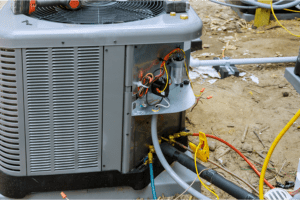If you’ve ever wondered how your air conditioner cools your home, this is where the real magic begins. It all starts with the evaporator coil. This part is crucial in maintaining a cool air temperature inside your home. Today, let’s talk about what the evaporator coil temperature is in an AC.
The Role of the Evaporator Coil
The evaporator coil sits inside the air handler. It’s located near or in the furnace or blower compartment. As warm air passes over the coil, it begins absorbing heat from your home. This process helps produce cold air, which is then sent through the ducts. But what exactly is the coil temperature supposed to be? Let’s talk about that first.
Understanding Evaporator Coil Temperature
The coil temperature is the actual temperature of the evaporator coil as your air conditioning system runs. An evaporator coil will hover between 40°F – 50°F when the system is running.
This temperature allows the AC systems to cool the air entering the coil. The evaporator delta t — or temperature difference — between the supply air and return air is the main indicator of how well your air conditioning is performing.
What Is Evaporator Delta T?
Evaporator delta t is a term that means the temperature difference between the air entering the return and the supply air coming out.
If the delta t is around 18°F – 22°F, your air system is probably doing a solid job at comfort cooling. Anything outside that range could mean problems. Maybe it’s a dirty evaporator coil, restricted airflow, or low refrigerant.
Why Coil Temperature Matters
When your evaporator coil temperature is too high, your cooling systems won’t produce cold air. The room feels sticky. You’ll wonder if your air conditioner is even on. On the flip side of the coin, if it’s too cold, the coil might freeze. Then, no cooling happens at all. So, getting that coil temperature just right is the real deal.
How the AC System Works
Let’s look at the bigger picture. Your air conditioning system has two coils: the first one is the condenser coil, and the second one is the evaporator coil. The evaporator coil absorbs heat from your home. The condenser coil releases that heat outside.
To do this, the AC uses a refrigerant. This refrigerant changes from a liquid state to a gas and back again. When it enters the evaporator coil, it’s in a liquid state. As it passes through, it picks up heat. That’s what cools the temperature of the air.
Then, it moves on to the condenser coil, where the heat is dumped outdoors. That’s the cycle. And it keeps running until the thermostat says, “We’ve hit the right temperature.”
The Role of the Expansion Valve & Metering Device
You might be thinking, how does refrigerant enter the evaporator coil in the right amount? That’s where the metering device or expansion valve comes in. These components help control the flow. They keep the coil from flooding with refrigerant. That’s super important for good heat transfer.
When the expansion valve works right, you get a good evaporator delta. If it clogs or sticks, then the temperature of the coil may fall outside the normal range.
What Can Go Wrong?
Several things can throw off the temperature of your evaporator coil:
- Evaporator coil that is dirty
- Low refrigerant levels
- Restricted airflow
- Faulty expansion valve
- Less refrigerant than needed
A dirty evaporator coil insulates the coil, so it can’t absorb enough warm air. That creates a problem with heat transfer. Your air conditioning system won’t cool the way it should.
Low refrigerant or less refrigerant means the coil won’t get cold enough. You’ll feel that through poor comfort cooling and maybe even rising bills.
If you’ve got restricted airflow, maybe from a blocked duct or dirty filter, the coil temperature goes down too far. That leads to freezing.
The Suction Side: Why Suction Pressure Matters
Another thing HVAC professionals look at is suction pressure. That’s the pressure in the refrigerant line going into the compressor. If it’s too high or too low, that’s a RED FLAG.
A low suction pressure may indicate that your evaporator coil is too cold. That could mean freezing is around the corner. High suction pressure could mean the system isn’t absorbing heat correctly.
What an HVAC Technician Looks For
A good HVAC tech will check:
- Evaporator delta t
- The temperature of the coil
- Supply air vs. return air temps
- Suction pressure
- Condition of the evaporator coil
All of these help the hvac experts figure out what’s going wrong — or what’s going right.
How It Affects Your Comfort
If the evaporator coil temperature is off, your house won’t feel cool. You might get warm air in one room and cold air in another. Or worse, you get only warm air everywhere.
That’s a clue that something’s not right with your AC system. The temperature difference just isn’t there. Your air handler might be working overtime with nothing to show for it.
Fixes You Can Ask For
If your AC system isn’t cooling right, here are a few fixes an HVAC tech might suggest:
- Checking for low refrigerant
- Cleaning the dirty evaporator coil
- Fixing a restricted airflow problem
- Replacing a broken metering device or expansion valve
These fixes from heating and cooling systems professionals help bring your coil temperature back into the right range. That means better comfort cooling and longer life for your AC system.
Final Thoughts on What Is Evaporator Coil Temp in AC
To wrap it up: What is the evaporator coil temperature in an AC? It’s the heart of cooling. It tells you if your AC systems are doing their job.
When everything is working just right, your evaporator coil cools the air entering, and you get the perfect temperature inside your home and in every room. A steady evaporator delta t means the AC system is picking up enough warm air and absorbing heat as it should.
If your AC isn’t cooling well, that coil temperature could be the key. Talk to an hvac tech, and they can get things back on track. Because at the end of the day, you just want clean, cold air — without the stress.
Is Your AC Not Cooling Right? Call Green Street HVAC Now!
The temperature plays a big role in how well your system cools your home. If the evaporator coil is too warm or too cold, your AC might not be giving you the cold air you expect. It could even cause freezing or issues with the airflow.
Green Street HVAC helps Tennessee homeowners figure out what’s going on inside their air conditioning systems. From expert thermostat repair and installation to full HVAC maintenance, we’re here to keep your heating and cooling system working effortlessly.
We also offer duct cleaning, dryer vent cleaning, smart home upgrades, aeroseal ductwork sealing, and ductwork repair for homes and commercial buildings across Tennessee.
Still unsure about what the evaporator coil temperature in AC is and how it affects your comfort? Call Green Street HVAC today. We’ll help get your air and heating system running cool, quiet, and reliable—just like it should be.





